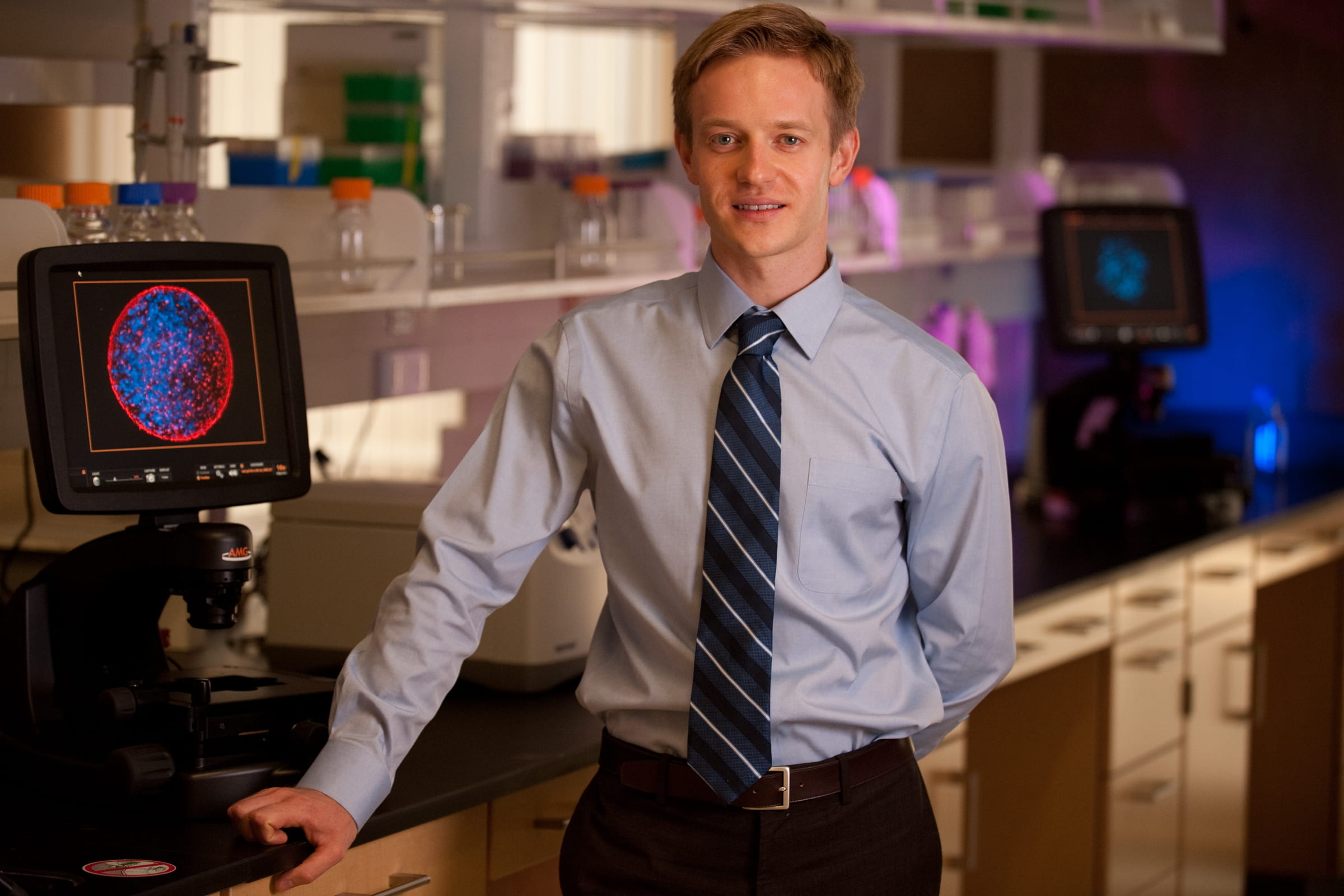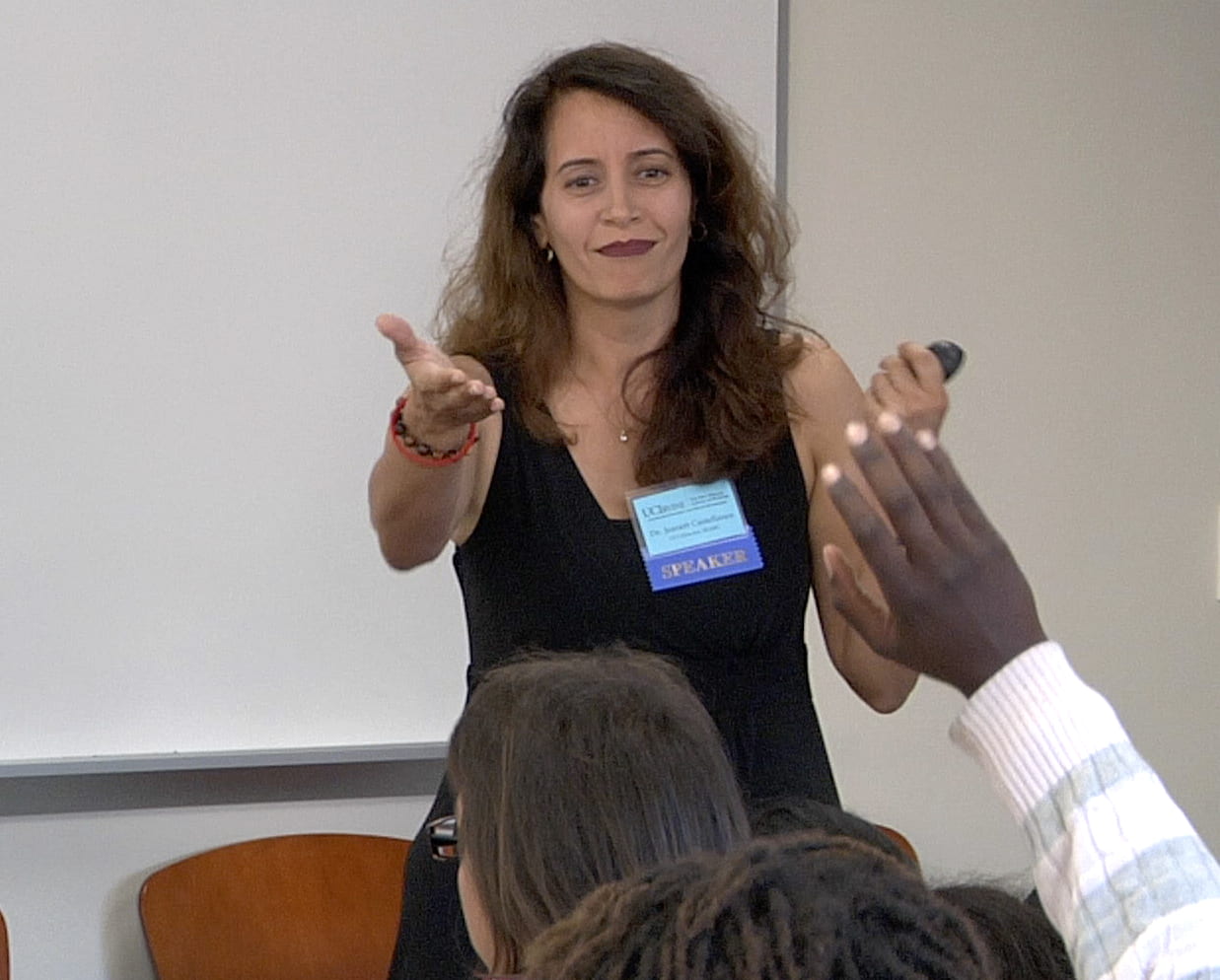Ambition rewarded
Sage Scholars program
Arturo Herrera came to UCI from the Coachella Valley, from a town he says was “98 percent Mexican.” The children of three small communities attended one high school, and violence was common. His mother and father still pick in the fields.
“It was a tough place to grow up,” says the 19-year-old sophomore. “Financially, it was hard. Socially, it was very hard. There was a lot of peer pressure.” Still, he worked hard, maintained a good academic record and had ambition. “My parents knew I had high standards for myself.”
A Regents’ Scholarship and financial aid brought him to UCI, where he was introduced to culture shock. “It was a complete turnaround. It was overwhelming when I came here. I’m still adjusting to it, actually.” A freshman class four times bigger than his high school graduating class, classmates from wildly varying ethnic backgrounds—”And the food!”
Today, Herrera works part-time at Merrill Lynch & Co., in a Newport Beach office where he can see the planes at John Wayne Airport. He loves his work, a genuinely demanding and responsible job in which he works with small businesses and nonprofits run by Southern California’s growing entrepreneur class – Asian Americans, African Americans and Latinos. His ethnic background and language skills are a big asset, and the satisfaction he gets from helping small businesses and social programs has him thinking about embarking on a double major in economics and social sciences.
Herrera’s placement at Merrill Lynch is a result of a new UC Office of the President initiative being piloted this year at two campuses, UCI and UC Berkeley. He is one of 15 students designated as “SAGE Scholars,” an acronym that stands for “Student Achievement Guided by Experience.”
SAGE Scholars are selected from freshman and transfer students who are high-achieving and talented, and come from low-income families. Generally, they are the first in their families to go to college. The program then matches them with employers who have committed to provide employment full-time during the summer and part-time during the school year. The internships continue for up to three years.
The employer also must provide each student with a mentor and with meaningful work. A Vietnamese American student who wants to be a mechanical engineer was assigned to help fit a nosecone onto a jet at Parker Aerospace. Other students have been writing computer software. One has been designing ads and putting together a volunteer program for the Pacific Symphony Orchestra.
Companies contribute $6,500 per sponsored student, which pays the student’s tuition and book fees. A market-rate wage also is paid to the student; during the past year students in the program have earned between $9 and $15 per hour.
Besides Merrill Lynch, employers participating in the program so far have included Broadcom, Conexant, Orange County Teachers’ Federal Credit Union, Parker Aerospace, Texas Instruments, UNISYS and Western Digital. Some companies have made contributions that were used to place students at nonprofit organizations like the Pacific Symphony Orchestra, Childrens Hospital of Orange County and Orangewood Childrens Foundation.
Karina Hamilton, who directs the program at UCI, put in a year of preparatory work before the first students were placed in internships. In January 2000, she advertised SAGE Scholars on campus, invited e-mailed applications and was deluged.
With fifteen slots to fill, “We had about 300 application requests from freshman and transfer students, and then of those, we received 75 completed applications. I interviewed those students and determined which ones would be in the talent pool for the program.” Interviewing 75 students took quite awhile, Hamilton said, but she found she just couldn’t bear to ignore any of the applicants. “Actually, I wanted to interview everybody.”
Students were selected by the end of the last school year and started their jobs at the beginning of summer.
While California universities can no longer target minorities, targeting income produces much the same effect, Hamilton said. First-year SAGE Scholars included six Latinos, two Korean Americans, two Vietnamese Americans, and one each African American, Chinese American, Filipina, Caucasian and Armenian American. There were six women and nine men.
The other side of the match-up was more work for Hamilton. Employers willing to sponsor the students had to be found. For this part of the program, UCI had a head start—an advantage that enabled it to enroll three times as many first-year Sage Scholars as Berkeley: the UCI Chief Executive Roundtable.
Comprised of about 80 chief executives of organizations doing business in Southern California, the roundtable meets four times a year with Chancellor Ralph Cicerone and university deans, serving the university as an advisory group, sounding board and reality check. It’s a model other universities have since imitated.
From the time the members heard about SAGE, they were eager to participate, said Roundtable Chair Chuck Haggerty, who is chairman of Irvine-based Western Digital. Their motives were both idealistic and pragmatic, he said.
“We believe as a group of CEOs that we need to support diversity in the workforce,” Haggerty says. “Secondly, once we can get a good student working on a part-time basis, the likelihood of us recruiting that student on graduation is very, very high. Recruiting costs on average can be in the area of $6,000-$10,000. The beauty is you get to look at a student or employee for two or three years before you make a hiring decision.”
The CEOs have been pleasantly surprised by the level of skill the SAGE Scholars have brought to their jobs, Haggerty says. “These students are absolute whizzes at programming and other skills that we pay people $50,000 or $70,000 a year for. We’ve got a student walking in and being productive right off the bat. It’s much more than we expected.”
Haggerty has become a champion for the program, actively recruiting more members to sponsor SAGE Scholar interns. He hopes for double the number next year, and more the year after that.
Arturo Herrera’s employer, Merrill Lynch, has been working to increase ethnic diversity both because it’s a good value and because it’s good business, said Herrera’s mentor, Garrett Gin. America’s economic boom years have put money into the hands of Asian Americans, African Americans, Latinos. Merrill Lynch wants to help them manage it, and wants to be the lender of choice.
“The things we’re doing here in the Community Development Group involve matching the capabilities of a Wall Street firm with the needs of the community. We want to make sure we’re connected to the community,” Gin says. “We need talented people to serve these markets, and sometimes culture and language are a really important factor.”
Gin says the entire office has enjoyed having Herrera work with them. “He’s very ambitious, very eager to gain information. He fits in well with our team. In some ways, having a student here reminds you that it’s important to be always learning, be optimistic. He has injected some youthful enthusiasm into the office.”
Herrera is thankful for the program’s insistence that its students be given significant work to handle; he’s met interns from other programs who are doing filing and are bored. His job has been to help run Merrill Lynch’s California Partnership for Economic Achievement, a program whose goal is to distribute $120 million in loans to minority-run businesses and nonprofits. “The biggest thing I’ve done was last summer, when I was the first contact for these small businesses trying to apply for the loan,” Herrera says. “I was the one tracking them and letting them know if they were eligible or not.”
The work has brought him into daily contact with mayors, lawyers and community leaders, all Hispanic. He has found it exciting and inspiring. “I get to meet all these people,” he says. “It’s incredible.”
Herrera goes out of his way to tell his fellow students about the program. “I tell them, if you see the word ‘SAGE,’ go and find out about it.”

